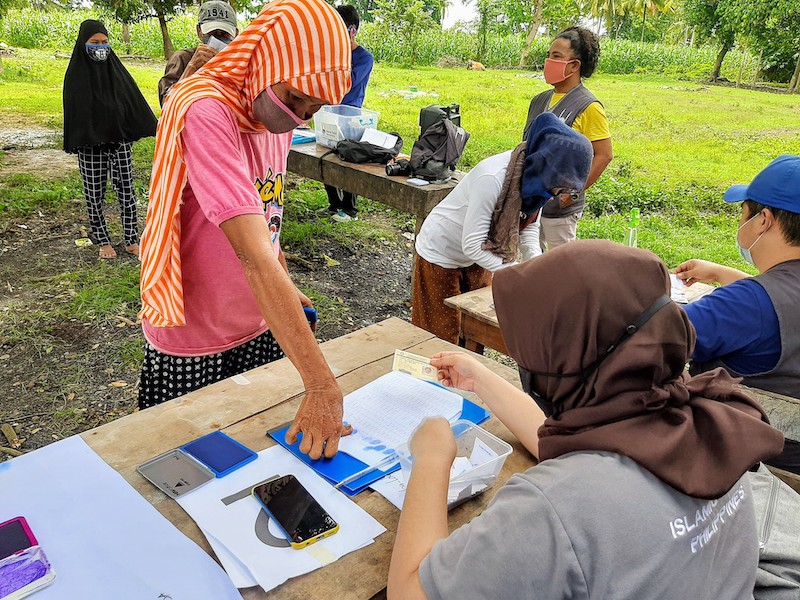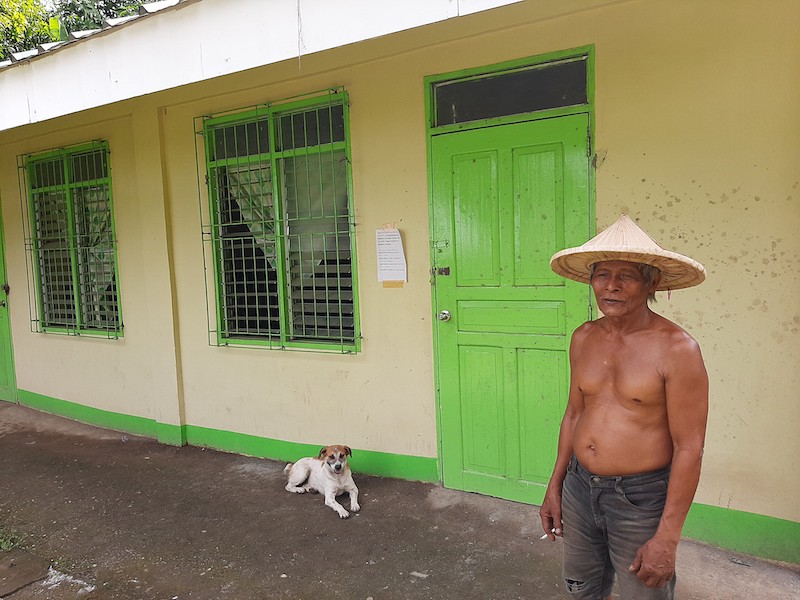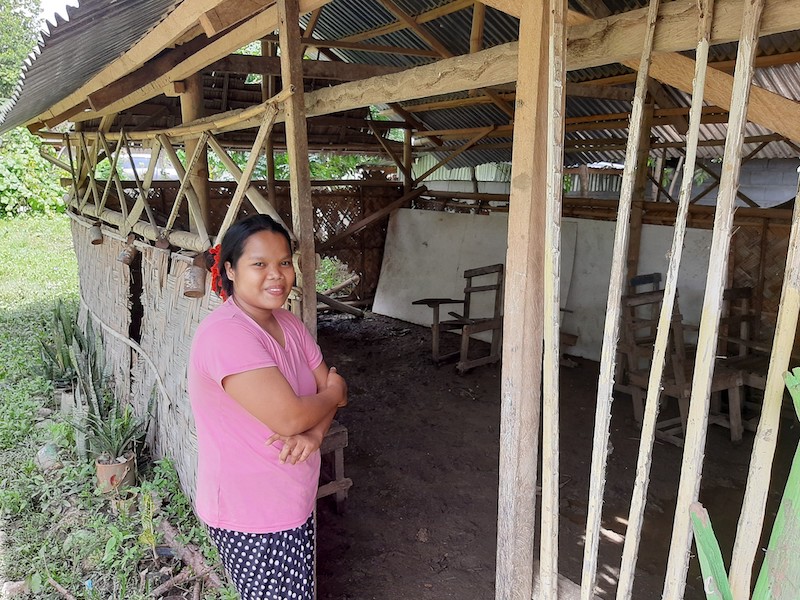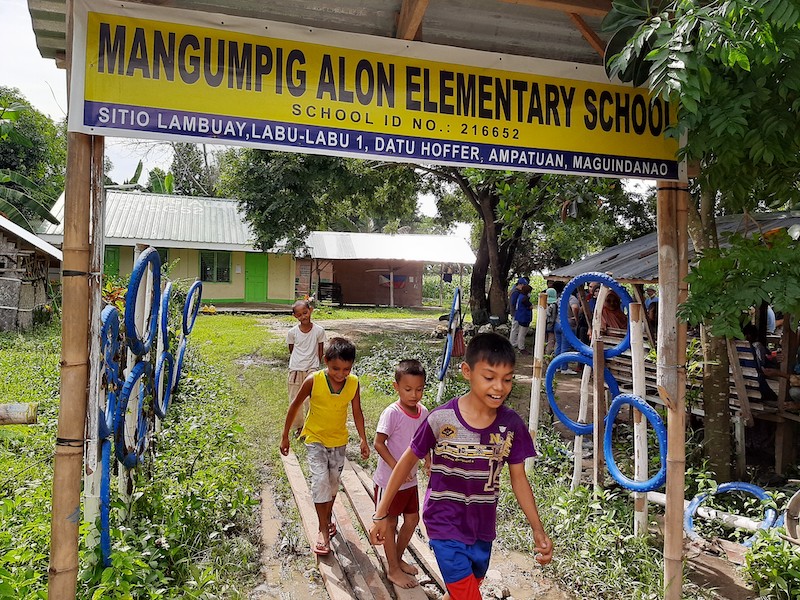DATU HOFFER, Maguindanao (MindaNews / 28 June) — Wearing a kumbong and a face mask, the woman patiently lined up for the relief packs intended for the poorest of the poor and vulnerable households. When she reached the registration table, she was asked to sign across her name on the list of pre-selected recipients. She hesitated a moment and then softly explained to the person in-charge that she does not know how to write her name. The staff gently responded that she did not have to worry as she can do a thumbmark instead.
 THUMBMARK. Like many other adults, this Maguindanao woman cannot read or write. Illiteracy is common among rural poor men and women in the BARMM, which has the lowest literacy rate in the country. MindaNews photo by JULES BENITEZ
THUMBMARK. Like many other adults, this Maguindanao woman cannot read or write. Illiteracy is common among rural poor men and women in the BARMM, which has the lowest literacy rate in the country. MindaNews photo by JULES BENITEZ
She was one of the 358 beneficiaries of the relief packs distributed by the Islamic Relief Worldwide-Philippines as part of the organization’s COVID-19 response in the barangays of Talibadok and Labu-labu 1, Datu Hoffer town in the province of Maguindanao, on June 24. Of this total, 121 males and females, or 34%, could not read and write.
Like the woman who registered with a thumbmark, Farida Alon, 62, mother of 12 and resident of Barangay Labu-labu 1, could not read and write, too. She, however, was not embarrassed to admit so. She was not able to go to school because they were poor and the school was far from their house. Her father died of tetanus infection and her mother succumbed to diarrhea while she was still young. This further jeopardized her chance of getting an education, as she and her siblings were left to fend for themselves. Her parents were also illiterate.
The cases of adult male and female illiteracy in the two barangays are not isolated. The Philippine Statistics Authority (PSA), which surveyed at least 26,000 households, reported in 2016 that the Autonomous Region in Muslim Mindanao (ARMM) registered the nation’s lowest functional literacy rate at 72.1%. The region has the lowest literacy rate, which on the national average was reported at 98.3% in 2015. This would mean that roughly one out of three individuals cannot read and write.
The ARMM has been reconfigured into the Bangsamoro Autonomous Region in Muslim Mindanao (BARMM) with the addition of Cotabato City and 63 barangays in North Cotabato which voted for inclusion in the new Bangsamoro region in early 2019.
Stopping Inter-generational Illiteracy
“Di ko kalilinyan I so mga wata ko na makagkumayabomba sa laki” (I do not want my grandchildren to be like me.), Farida said. Speaking in her native Maguindanaon tongue, she added “I want them to go to school.”
But five years ago, the school was more than 30 minutes away on foot from where Farida and her grandchildren lived. The distance was a source of discouragement for the children to continue schooling.
The PSA reported a dropout rate in basic education in the autonomous region at 14% in 2016, higher than the national average of 10%. Access to the schools was one of the factors for the school dropout. The PSA also noted that 26% of those who dropped out, left their classrooms to look for jobs, 17.7% to marry, and 16.5% lost interest in pursuing their basic education.
Farida knew that she had to do something if she wanted the inter-generational illiteracy in her family to stop. She talked to her husband about the problem and both agreed to donate half a hectare of their land for government to build a school just adjacent to their home.
 STOP ILLITERACY.. Mangumpig Alon, 68, a famer who stopped schooling after Grade V of basic education donated 2,000 square meters of land for a school in his village in Datu Hoffer, Maguindanao to be built so that children of his community will not have to walk far to gain education. MindaNews photo by JULES BENITEZ
STOP ILLITERACY.. Mangumpig Alon, 68, a famer who stopped schooling after Grade V of basic education donated 2,000 square meters of land for a school in his village in Datu Hoffer, Maguindanao to be built so that children of his community will not have to walk far to gain education. MindaNews photo by JULES BENITEZ
Mangumpig Alon, 68, Farida’s husband, explained in broken Tagalog that he and his wife decided to donate half a hectare of his eight-hectare farmland “so that the children need not walk far when going to school.” More than accessibility, the man wanted the current generation of children to finish schooling. This is something that he was not able to do in his youth, as he only reached the fifth grade.
To honor his land donation, the school was named after him, Mangumpig Alon Elementary School, perhaps the only school in town that is named after a farmer.
From one to three to four classrooms
The school first opened five years ago with one classroom made of light materials. Later, the local government built a two-classroom concrete building. Then came the small classroom for the kindergarten pupils.
As of schoolyear 2019 to 2020, the school with only four classrooms had a population of 124 students, from kindergarten to Grade VI.
Due to lack of classrooms, the school decided to hold multi-grade classes where one grade level is lumped together with students from another level. The Kindergarten and Grade I students share one room, those in Grade II and III share another room, students of Grades IV and V occupy the third room, and the Grade VI students have the fourth room for themselves.
The lack of classrooms is not the only problem. Last year, there were only four teachers, including the school principal, handling the entire elementary curriculum. This coming school year, three more teachers have been deployed, bringing the total to seven.
Volunteer Teacher and a Makeshift Classroom
The classroom that the Grade II and III students shared in the past schoolyear, does not have a floor. When it rains, the ground inside the classroom becomes muddy. The walls are made of dilapidated amakan (bamboo weave). The roof is made of GI sheets and does not have a ceiling. On sunny days, the low tin roofing makes the classroom scorching hot. Inside, the children’s desks — less than a dozen of them — are broken. There is no teacher’s table.
Nida Alon, 27, daughter of Farida and Mangumpig, handled Grades II and III students in the makeshift classroom until mid-March when classes were suspended because of the COVID-19 pandemic. The school decided to end the school year and promoted the students to the next grade level.
Her employment status is volunteer teacher, receiving an honorarium of 5,000 pesos per month.
“I have not passed the teacher’s board yet,” she said, explaining her volunteer status.
 Classroom. This was the first classroom built by the community residents for the school in Datu Hoffer, Maguindanao. Now old and dilapidated, this room still holds classes for Grades II and III students on a multi-grade arrangements because the school lacks classrooms. MindaNews photo by JULES BENITEZ
Classroom. This was the first classroom built by the community residents for the school in Datu Hoffer, Maguindanao. Now old and dilapidated, this room still holds classes for Grades II and III students on a multi-grade arrangements because the school lacks classrooms. MindaNews photo by JULES BENITEZ
Teacher Nida explained that the school did not have a budget to repair her classroom. The barangay government also did not have the funds as it is a newly created barangay split from the original Labu-labu barangay which retained all the Internal Revenue Allotment (IRA). The municipal government of Datu Hoffer itself was created in April 2008 by virtue of Muslim Mindanao Act of 220 but got its IRA only in 2020 from the newly established Bangsamoro region.
“I tried asking the parents of my students to help rehabilitate the classroom or donate desks for their children. But the families are poor and do not have extra money to buy building materials,” the teacher said.
When face-to-face classes are allowed to resume, teacher Nida does not expect the situation to improve. “We will just have to make do with what we have, and give our pupils the best that we can,” she said.
Learning amid COVID-19
The national policy, however, is that there will be no face-to-face classes when classes resume on August 24.
Last month, the national Inter-Agency Task Force on COVID-19 approved the proposal of Education Secretary Leonor Briones on the Basic Education Learning Continuity Plan which provides, among others, that face-to-face learning “shall only be allowed when the local risk severity grading permits, and subject to compliance with minimum health standards;” that adoption of various learning delivery options “such as but not limited to face-to-face, blended learnings, distance learnings, and homeschooling and other modes of delivery shall be implemented depending on the local COVID Risk Severity Classification and compliance with minimum health standards” and that the conduct of curricular and co-curricular activities involving gatherings such as science fairs, showcase of portfolios, trade fairs, school sports, campus journalism, festival of talents, job fairs, and other similar activities is cancelled, except those conducted online.
 Named after a Farmer. This five-year-old elementary school is named after a humble farmer who wanted the present generation of children of Datu Hoffer, Maguindanao to be educated. MindaNews photo by JULES BENITEZ
Named after a Farmer. This five-year-old elementary school is named after a humble farmer who wanted the present generation of children of Datu Hoffer, Maguindanao to be educated. MindaNews photo by JULES BENITEZ
School principal Rey Patarata narrates that upon instructions from the national Department of Education, they are “conducting a survey among parents and students on their preferred modality of learning for the incoming school year given the COVID-19 pandemic.”
Parents and the students are being asked to choose among the following modalities for learning: through radio; through television; online learning, or through module approach.
The 33-year old Patarata notes that initial results of the survey indicate that both parents and students prefer the modular approach. This approach will make the parents as the main driver of their children’s learning process because they will facilitate the accomplishment of modules by their respective children at home. The modules, which will include notes on the subject matter and worksheets, are still being developed by the DepEd, according to the school principal.
The modular approach, however, presupposes that the parents are literate.
“Sad to say, not all (the parents) are literate. My rough estimate is 85% are not literate,” the principal says.
“In cases where the parents are illiterate and there is no one in the house hold who can help the child, the second option is to do house-to-house individual mentoring,” Patarata explains.
If it were for Patarata to decide on the learning modality for the community of Labu-labu 1, he would prefer face-to-face classes as there are no COVID-19 cases in the municipality of Datu Hoffer.
The school, however, will have to follow whatever the Education authorities will decide regarding the incoming school year, Patarata said. (Jules Benitez / MindaNews contributor)
